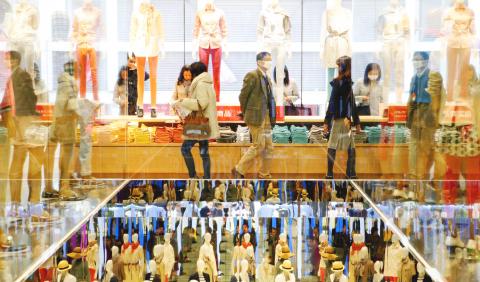Japan’s cheap chic clothing chain Uniqlo opened the doors to its new 12-floor Tokyo megastore yesterday, making a splash in the upmarket Ginza area as part of a drive across Asia.
“Opening a flagship store here is the first step to expand the business from here to the whole of Asia,” Uniqlo chief executive Tadashi Yanai said ahead of the opening on the district’s glitzy “Chuo Dori” high street.
“Ginza is the best location in Japan, and more so, it is the best place in Asia,” he said. “This is -Japan’s largest gateway to the global market.”

Photo: Reuters
Uniqlo’s parent company, Fast Retailing, which began in 1949 as a small clothing shop for men in western Yamaguchi Prefecture under Yanai’s father, has grown into one of Japan’s most successful corporations.
After opening megastores in several major world cities, including New York, London and Paris, Uniqlo has shifted its focus to rapidly growing Asia, and is now operating in Shanghai, Taipei and Seoul.
“We want to expand our stores to all the main cities in Asia,” said Yanai, who is looking at 100 new outlets across the continent in the year to August.
“Unfortunately, Japan is in a state of deadlock due to the ageing population, the low birth rate and politics being in deadlock,” Yanai said. “But when I look at Japan as a part of Asia, a member of the world, I feel excited about the gigantic potential.”
For the Ginza flagship store — the firm’s biggest in the world — it has hired sales staff who can assist customers in five foreign languages: English, Chinese, Korean, French and Spanish.
Ginza has for years been the center of upmarket fashion in Japan, host to the likes of Louis Vuitton and Hermes, with price tags — and rental fees — to match.
However, global fast-fashion and casual retailers — H&M, Zara, Forever 21 and Gap — have appeared on Chuo Dori in recent years.
Government records show land in the area sold just over a year ago for ¥20 million (US$234,000) per square meter.
It was not known how much Uniqlo was paying for its 5,000m2 of retail space, but the building dwarfs that of Zara, which sits opposite.
However, it is significantly smaller than the 36,000m2 occupied by Mitsukoshi department store, the grand old dame of Ginza.
Yanai said the new megastore is expected to post ¥10 billion in revenues after a year.

Jensen Huang (黃仁勳), founder and CEO of US-based artificial intelligence chip designer Nvidia Corp and Taiwan Semiconductor Manufacturing Co (TSMC, 台積電) on Friday celebrated the first Nvidia Blackwell wafer produced on US soil. Huang visited TSMC’s advanced wafer fab in the US state of Arizona and joined the Taiwanese chipmaker’s executives to witness the efforts to “build the infrastructure that powers the world’s AI factories, right here in America,” Nvidia said in a statement. At the event, Huang joined Y.L. Wang (王英郎), vice president of operations at TSMC, in signing their names on the Blackwell wafer to

France cannot afford to ignore the third credit-rating reduction in less than a year, French Minister of Finance Roland Lescure said. “Three agencies have downgraded us and we can’t ignore this cloud,” he told Franceinfo on Saturday, speaking just hours after S&P lowered his country’s credit rating to “A+” from “AA-” in an unscheduled move. “Fundamentally, it’s an additional cloud to a weather forecast that was already pretty gray. It’s a call for lucidity and responsibility,” he said, adding that this is “a call to be serious.” The credit assessor’s move means France has lost its double-A rating at two of the

AI BOOST: Although Taiwan’s reliance on Chinese rare earth elements is limited, it could face indirect impacts from supply issues and price volatility, an economist said DBS Bank Ltd (星展銀行) has sharply raised its forecast for Taiwan’s economic growth this year to 5.6 percent, citing stronger-than-expected exports and investment linked to artificial intelligence (AI), as it said that the current momentum could peak soon. The acceleration of the global AI race has fueled a surge in Taiwan’s AI-related capital spending and exports of information and communications technology (ICT) products, which have been key drivers of growth this year. “We have revised our GDP forecast for Taiwan upward to 5.6 percent from 4 percent, an upgrade that mainly reflects stronger-than-expected AI-related exports and investment in the third

RARE EARTHS: The call between the US Treasury Secretary and his Chinese counterpart came as Washington sought to rally G7 partners in response to China’s export controls China and the US on Saturday agreed to conduct another round of trade negotiations in the coming week, as the world’s two biggest economies seek to avoid another damaging tit-for-tat tariff battle. Beijing last week announced sweeping controls on the critical rare earths industry, prompting US President Donald Trump to threaten 100 percent tariffs on imports from China in retaliation. Trump had also threatened to cancel his expected meeting with Chinese President Xi Jinping (習近平) in South Korea later this month on the sidelines of the APEC summit. In the latest indication of efforts to resolve their dispute, Chinese state media reported that